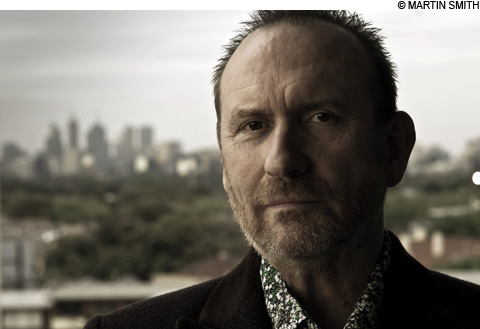
BACK OVER On his latest solo record, Gathering Mercury, Men at Work's Colin Hay returns to his Scottish roots. |
Last month, tragedy struck when Men at Work's Greg Ham was found dead April 19 in his home. With no evidence of foul play, suicide has been suggested.
Known for his trademark woodwind and brass work, Ham had grown despondent in the past two years since a judgment was ordered claiming that some of Ham's flute passages in "Down Under" plagiarized the 1934 Australian folk-classic "Kookaburra." I asked Men at Work founder Colin Hay to say a few words about his friend.
"He was a very smart guy," Hay says via phone, near Philadelphia. "In the early '70s he just decided to become a musician and took up saxophone, flute, keyboards, and guitar. He became really good and practiced all the time. When it came time to put this thing together, I had always remained friends with him, so he was an obvious person to ask to join the band — not only because he played those instruments, but because he was a great performer and one of the funniest people I've ever met. It's one of those things you can't make sense of and you wish you could have had more of an effect on how he felt about himself."
Despite recent events, Hay is not stuck in a reverie about his old band. He's not even stuck in Australia. It wasn't until I heard the dear ol' Glasgow strains of "Where the Sky Is Blue" from his recent solo record, Gathering Mercury (Compass), that I knew the singer/guitarist was actually from Scotland. "I moved from there when I was 14," he says. Like Grease in reverse, the teenager and his family were transported to the suburbs of Melbourne in the late '60s. Away from the familiarities of home and his family's music shop where he grew up on the British Invasion (the Kinks are the most obvious influence at play), Hay found himself pretty happy to be away from the rough sectarian streets of Scotland.
"Australia was much more egalitarian and freer in a way," he says. "The oceans were big. The kids had cars. It was brilliant. It was a great place to go when you were 14."
The boldness of his family's move gave birth to Hay's spirit of adventure. Between 1981 and 1985 Men at Work made three records, producing two smash hits immediately with "Who Can It Be Now" and "Down Under," plus a strong follow-up hit with "Overkill." Gifted in crafting sensitive, understated folk-rock songs — like the elegiac and super-catchy "Send Somebody," or the bittersweet hymn to his departed father, "Dear Father" — Hay issued his first sleepy solo album in 1987 and has since released 10 more. In the early '90s he relocated to the US and began touring frequently. Reunions with Men at Work ran their course, but that success was not to be repeated in Hay's solo career. Breaks eventually came, such as having his songs appear on Scrubs. Word of mouth gradually took Hay's act from venues of 100-capacity rooms to bigger halls, such as the Berklee Performance Center, which he plays this Friday. Gradual success would show that as much as Australia was merely a chapter in the troubadour and skilled raconteur's life, so indeed was Men at Work.